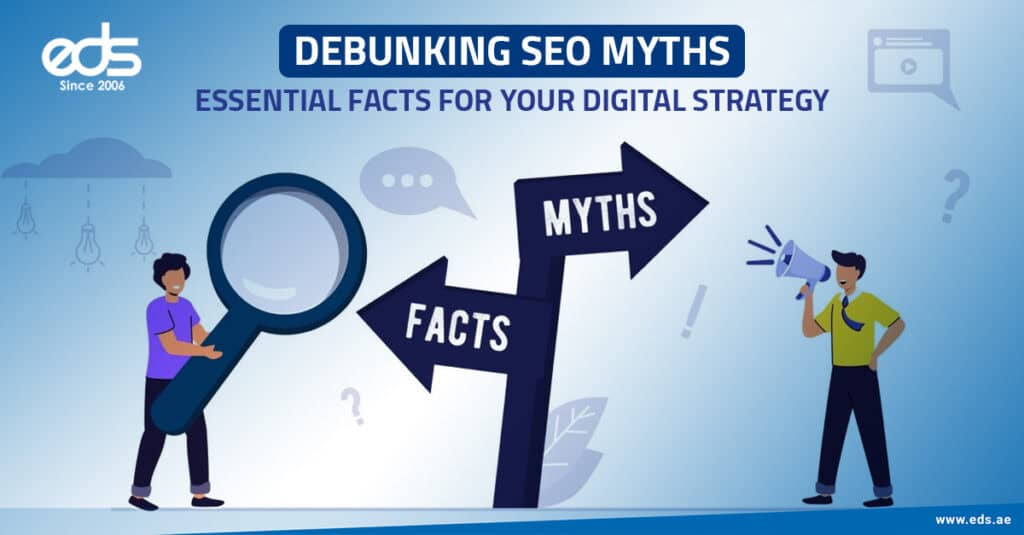Digital marketing‘s essential component, search engine optimization (SEO), has a big impact on how visible and popular your website is. Still, a lot of false beliefs and assumptions exist about SEO that can mislead companies. We’ll dispel some popular SEO lore in this blog and provide you the knowledge you need to successfully optimize your website.
Myth 1: SEO Is a One-Time Task
Reality: SEO Requires Ongoing Effort
The idea that SEO is a one-time job is among the most widespread misconceptions about it. Many people think they can relax and reap the rewards after optimizing their website. Actually, SEO is a continual process that needs constant work. The algorithms used by search engines are always changing, and your rivals are always trying to get higher up in the results. Maintaining and raising your website’s search engine rankings requires regular content updates, performance tracking, and algorithm adaptation.
Myth 2: More Keywords = Better Rankings
Reality: Quality Over Quantity
The idea that cramming your content with keywords can improve ranks is another widespread myth. Even though keywords are crucial, search engines give quality a higher priority than quantity. Stuffing keywords into content will not only make for a bad user experience but may potentially result in search engine penalties. Rather, concentrate on producing excellent, pertinent content that organically includes keywords. Find out the terms your audience is using to look for via keyword research, then naturally include those terms into your content.
Myth 3: Meta Tags Don’t Matter Anymore
Reality: Meta Tags Are Still Important
Some people think that in the current SEO environment, meta tags are no longer necessary. Meta tags are still important, even though search engines have changed and now consider many different variables when determining where to rank a page. Search engines can better comprehend the content of your pages and affect click-through rates with the use of title tags and meta descriptions. Properly written meta tags have the power to increase website visibility and draw in more visitors.
Myth 4: Backlinks Are All That Matter
Reality: Backlinks Are Important, But Not Everything
One of the most important components of SEO is backlinks, or inbound links from other websites. But it’s a mistake to depend only on backlinks for SEO success. Although they can help you rank higher, high-quality backlinks are only one aspect of the puzzle. A strong SEO strategy also includes on-page SEO, high-quality content, user experience, mobile friendliness, and site speed. The best outcomes will come from a balanced strategy that takes into account each of these variables.
Myth 5: Social Media Doesn’t Affect SEO
Reality: Social Media Can Indirectly Impact SEO
It’s a popular misconception that social media use has little bearing on SEO. Social media signals might affect your SEO efforts indirectly even though they are not a direct ranking factor. Social media sites are great for building backlinks, boosting brand awareness, and increasing website traffic. Furthermore, social media-promoted material has a higher chance of being linked to and shared by other websites, which might raise your search engine rankings.
Myth 6: You Need to Rank #1 for Success
Reality: Focus on Relevant Keywords and Quality Traffic
Although it can be useful, ranking #1 for your target keywords is not the only indicator of SEO success. Achieving a high ranking for pertinent keywords that bring in high-quality visitors to your website is increasingly crucial. Concentrating on specialty subjects and long-tail keywords can draw in more likely-to-convert visitors. Moreover, offering an excellent user experience and insightful content will promote client loyalty and repeat business, both of which are essential for long-term success.
Myth 7: SEO Guarantees Instant Results
Reality: SEO Takes Time
Although this is rarely the case, many businesses expect instantaneous benefits from their SEO efforts. SEO is a long-term approach that calls for perseverance and patience. You might not notice noticeable increases in your traffic or rankings for several months. To succeed in SEO, one must put in constant work, assess their progress, and make required adjustments. Any business that guarantees immediate results should be avoided since it can be employing unethical tactics that could damage your website in the long run.
Conclusion
Creating a strategy that works requires an understanding of SEO realities. Dispelling these widespread misconceptions will allow you to concentrate on the things that really count, like producing excellent content, making your website user- and search engine-friendly, and keeping a balanced approach to all things SEO. Keep in mind that SEO is a journey, not a sprint. You’ll eventually reap the benefits if you continue to learn and have patience.
If you need expert guidance on your SEO journey, contact us today!

